Related Research Articles
A doxology is a short hymn of praises to God in various forms of Christian worship, often added to the end of canticles, psalms, and hymns. The tradition derives from a similar practice in the Jewish synagogue, where some version of the Kaddish serves to terminate each section of the service.

A hymnal or hymnary is a collection of hymns, usually in the form of a book, called a hymnbook. They are used in congregational singing. A hymnal may contain only hymn texts ; written melodies are extra, and more recently harmony parts have also been provided.
The Moon System of Embossed Reading is a writing system for the blind, using embossed symbols mostly derived from the Latin script. It is claimed by its supporters to be easier to understand than braille, though it is mainly used by people who have lost their sight as adults, and thus already have knowledge of the shapes of letters.

James Hudson Taylor was a British Baptist Christian missionary to China and founder of the China Inland Mission. Taylor spent 54 years in China. The society that he began was responsible for bringing over 800 missionaries to the country who started 125 schools and directly resulted in 20,000 Christian conversions, as well as the establishment of more than 300 stations of work with more than 499 local helpers in all 18 provinces.
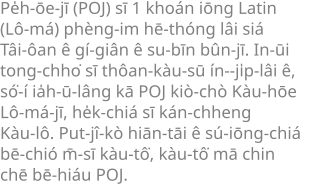
Pe̍h-ōe-jī, sometimes known as Church Romanization, is an orthography used to write variants of Hokkien Southern Min, particularly Taiwanese and Amoy Hokkien, and it is widely employed as one of the writing systems for Southern Min. During its peak, it had hundreds of thousands of readers.

The Fuzhou language, also Foochow, Hokchew, Hok-chiu, or Fuzhounese, is the prestige variety of the Eastern Min branch of Min Chinese spoken mainly in the Mindong region of Eastern Fujian Province. As it is mutually unintelligible to neighbouring varieties in the province, under a technical linguistic definition Fuzhou is a language and not a dialect. Thus, while Fuzhou may be commonly referred to as a 'dialect' by laypersons, this is colloquial usage and not recognised in academic linguistics. Like many other varieties of Chinese, the Fuzhou dialect is dominated by monosyllabic morphemes that carry lexical tones, and has a mainly analytic syntax. While the Eastern Min branch it belongs to is relatively closer to other branches of Min such as Southern Min or Pu-Xian Min than to other Sinitic branches such as Mandarin, Wu Chinese or Hakka, they are still not mutually intelligible.

Maria Jane Taylor was a British Protestant Christian missionary to China, and "Mother" of the China Inland Mission with her husband, founder James Hudson Taylor. She was a pioneer missionary and educator there for 12 years. In 1858, she married Taylor and was an invaluable assistant and influence to him. In her time with the CIM, she was instrumental in training single women to be missionaries in China, when opportunities for women to serve had been previously dependent on having a missionary husband.
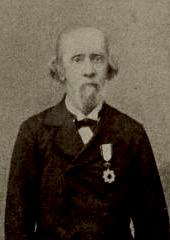
Divie Bethune McCartee (1820–1900) was an American Protestant Christian medical missionary, educator and U.S. diplomat in China and Japan, first appointed by the American Presbyterian Mission in 1843.
Presbyterian Mission Agency is the ministry and mission agency of the Presbyterian Church (U.S.A.). Founded as the Western Foreign Missionary Society by the Presbyterian Church in the United States of America in 1837, it was involved in sending workers to countries such as China during the late Qing dynasty and to India in the nineteenth century. Also known as the Foreign Missions Board in China, its name was changed by the Old School body during the Old School–New School Controversy to the Presbyterian Board of Foreign Missions.

Josiah Goddard (1813–1854) was an American Baptist missionary in China.
William Muirhead was a Protestant Christian missionary who served with the London Missionary Society during the late Qing Dynasty in China.
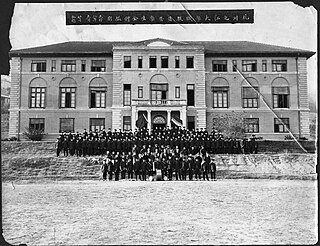
Hangchow University, also spelled as Zhijiang University and formerly known as Hangchow Christian College, Hangchow College, and Hangchow Presbyterian College, is a defunct Protestant missionary university in China, which is one of the predecessors of Zhejiang University. Founded as the Ningpo Boys' Boarding School by Divie Bethune McCartee and colleagues of Northern Presbyterian Church in Ningbo in 1845, the university was one of the oldest missionary schools in China before it was shut down in 1952. The university was merged into Zhejiang University and other universities in China. Its campus was taken over by Zhejiang University as its Zhijiang Campus in 1961, which became a major nationally protected historic site in 2006.
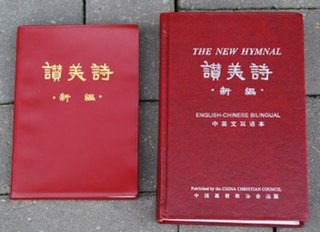
The Chinese New Hymnal was published in the early 1980s and is the main hymnal used by the Protestant churches registered through the TSPM in present-day China.
Ningbo's origins date back to over 6,800 years, and its history as a major city began 2,000 years ago, becoming a port for foreign trade during the Tang and Song dynasties. Most of the trade was done by foreign merchants coming to Ningbo.
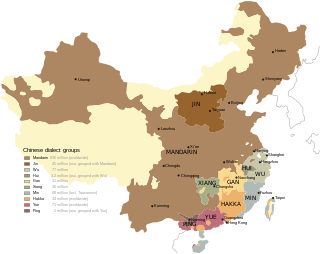
The Great Dictionary of Modern Chinese Dialects is a compendium of dictionaries for 42 local varieties of Chinese following a common format. The individual dictionaries cover dialects spread across the dialect groups identified in the Language Atlas of China:

A Syllabic Dictionary of the Chinese Language: Arranged According to the Wu-Fang Yuen Yin, with the Pronunciation of the Characters as Heard in Peking, Canton, Amoy, and Shanghai or the Hàn-Yīng yùnfǔ 漢英韻府, compiled by the American sinologist and missionary Samuel Wells Williams in 1874, is a 1,150-page bilingual dictionary including 10,940 character headword entries, alphabetically collated under 522 syllables. Williams' dictionary includes, in addition to Mandarin, Chinese variants from Middle Chinese and four regional varieties of Chinese, according to the 17th-century Wufang yuanyin 五方元音 "Proto-sounds of Speech in All Directions".

A Chinese–English Dictionary (1892), compiled by the British consular officer and sinologist Herbert Allen Giles (1845–1935), is the first Chinese–English encyclopedic dictionary. Giles started compilation after being rebuked for criticizing mistranslations in Samuel Wells Williams' (1874) A Syllabic Dictionary of the Chinese Language. The 1,461-page first edition contains 13,848 Chinese character head entries alphabetically collated by Beijing Mandarin pronunciation romanized in the Wade–Giles system, which Giles created as a modification of Thomas Wade's (1867) system. Giles' dictionary furthermore gives pronunciations from nine regional varieties of Chinese, and three Sino-Xenic languages Japanese, Korean, and Vietnamese. Giles revised his dictionary into the 1,813-page second edition (1912) with the addition of 67 entries and numerous usage examples.

The Church Missionary Society in China was a branch organisation established by the Church Missionary Society (CMS), which was founded in Britain in 1799 under the name the Society for Missions to Africa and the East; as a mission society working with the Anglican Communion, Protestant, and Orthodox Christians around the world. In 1812, the organization was renamed the Church Missionary Society. The missions were financed by the CMS with the local organisation of a mission usually being under the oversight of the Bishop of the Anglican diocese in which the CMS mission operated.

Canaan Hymns or Songs of Canaan is a collection of Chinese hymns composed by Lü Xiaomin, a Christian convert peasant woman with no musical education, beginning in 1990. Lü's theological background is in Pentecostalism and the local churches movement, and the hymns reflect themes of Christology, pneumatology and eschatology against the backdrop of Chinese political realities.
References
Citations
- ↑ Donald MacGillivray Biographical Dictionary of Chinese Christianity
- 1 2 3 4 5 6 7 8 9 10 11 12 13 14 15 16 17 18 19 20 21 22 23 24 25 26 27 28 29 30 31 32 33 34 35 36 37 38 39 40 41 42 43 44 45 46 47 48 49 50 51 52 53 54 55 56 57 58 59 Christian Literature Society for China (1912), 253-259
- ↑ Strandenæs (2009), p. 146.
- ↑ Brink, Emily (Spring 2008). "Glimpses of Recent Chinese Hymnody: Including a Review of the 2006 Edition of Hymns of Universal Praise". The Hymn . 59 (2): 12–13.
- 1 2 Strandenæs (2009), p. 156.
- ↑ "《聖經報‧文摘》". www.bible-magazine.net. Retrieved 2018-03-05.
- ↑ Newbern, William C. (1973). The Cross and the Crown. Hong Kong: The Alliance Press.
Sources
- Christian Literature Society for China (1912). The China Mission Year Book. Shanghai: Christian Literature Society for China.
- Hsieh, Fang-Lan (2009). A History of Chinese Christian Hymnody: From Its Missionary Origins to Contemporary Indigenous Productions. Lewiston N.Y.: Edwin Mellen Press. ISBN 9780773438163.
- Strandenæs, Thor (2009), "The Never Ending Song: The Contextualization of Chinese Christian Hymnody", in Jørgensen, Knud; Tormod Engelsviken (eds.), Mission to the World: Communicating the Gospel in the 21st Century : Essays in Honour of Knud Jørgensen, Eugene, OR: Wipf & Stock, pp. 146–160, ISBN 978-1608991105